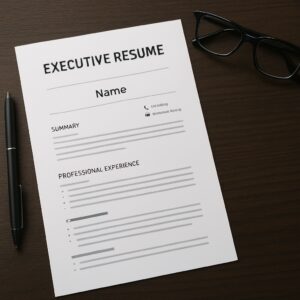Key Takeaways
- Understand the essentials of crafting an executive resume to enhance your career prospects.
- Explore strategies that differentiate an executive resume from other types.
- Discover actionable tips to make your resume stand out in a competitive market.

Table of Contents
- The Role of an Executive Resume
- Key Elements to Include
- Tailoring for Your Industry
- Common Mistakes to Avoid
- Writing Tips for Impact
- Utilizing Online Resources
- The Value of Professional Help
- Maintaining Your Resume
Creating an effective resume for an executive role requires a strategic approach highlighting leadership, impact, and long-term value. Unlike standard resumes, executive resumes must convey a straightforward narrative that aligns with high-level business goals and showcases the ability to drive results across departments or industries. Focusing on achievements rather than responsibilities is essential, as well as using measurable outcomes to demonstrate success, such as revenue growth, operational improvements, or team development. The language should be concise yet powerful, reflecting a confident understanding of strategic planning, decision-making, and organizational leadership. A well-structured resume will also tailor content to specific roles, incorporating relevant keywords to navigate applicant tracking systems while maintaining a human, engaging tone. Visual clarity and formatting also play a role, ensuring key information stands out without being overly designed. Ultimately, the goal is to present a compelling, results-driven profile that reflects past success and signals readiness for future challenges in a leadership position.
The Role of an Executive Resume
Crafting an executive resume requires a unique blend of creativity and precision, involving a strategic approach to showcase your professional narrative. This document not only functions as a record of past roles but also highlights your capacity for leadership and impact on organizational success. Unlike standard resumes, which might focus solely on skills and experience, an executive resume emphasizes strategic vision and leadership achievements. It tells a compelling story about how your contributions have driven meaningful change and sustained growth in your previous roles. The ability to succinctly communicate such milestones is crucial for capturing the attention of high-level recruiters and decision-makers.
When exploring executive resume pricing options, it’s essential to consider the value of a well-crafted resume that aligns with professional goals and market demands. A competitive executive resume highlights past successes and projects future potential and alignment with organizational visions. Employers look for resumes that reflect a sophisticated understanding of the business landscape and demonstrate an aptitude for strategic problem-solving. Such a document must balance succinctness with comprehensive detail, ensuring that your key accomplishments are effectively conveyed without overwhelming the reader.
Key Elements to Include
An executive resume should carefully weave together several crucial elements to paint a robust picture of your professional journey. Initiating with an impactful summary, this section serves as an introduction and a cornerstone for your brand. It sets the tone for the resume, encapsulating your leadership philosophy, career achievements, and the unique value proposition you offer prospective employers. Crafting a compelling summary requires melding your career aspirations with past successes, vividly depicting your strengths and executive potential.
Beyond the summary, a detailed account of achievements is essential, emphasizing metrics to underscore your leadership’s impact. Quantifiable results, such as “boosted sales by 35% within the first year” or “led a cross-functional team to complete a critical project ahead of schedule, increasing efficiency by 25%,” lend additional credibility to your resume. These figures provide tangible evidence of your capabilities and offer a clear, direct means of comparing your contributions against other candidates vying for the same high-profile roles.
Tailoring for Your Industry
Each industry presents a distinct set of standards, expectations, and preferred modes of communication, making it essential to customize your resume for the specific sector you wish to enter. For instance, it is crucial to highlight your innovations, technical skills, and adaptability to new tools or methodologies within the technology sector, as demonstrating your ability to leverage cutting-edge technologies can differentiate you from other candidates. This might include detailing specific programming languages, software development methodologies, or projects where you successfully implemented new technologies to improve productivity or user experience.
Conversely, in the finance sector, your resume should focus on key aspects such as fiscal prudence, regulatory compliance, and strategic investment initiatives. This could involve showcasing your experience with financial modeling, risk assessment, or your expertise in navigating complex financial regulations like the Dodd-Frank Act. Quantifying your achievements, such as “managed a portfolio that achieved a 15% return in a volatile market,” can provide tangible evidence of your capabilities.
Understanding these industry-specific nuances underscores your suitability for the role and demonstrates your readiness to tackle the challenges and demands unique to that field. By tailoring your resume, you signal to potential employers that you are well-informed about and prepared for the industry’s specific needs.
This alignment enhances your profile as a candidate and highlights the depth and breadth of your experience, effectively illustrating how your leadership can drive success within the sector. Incorporating industry-relevant terminology and focusing on sector-specific accomplishments, such as “led a cross-functional team to streamline compliance processes, resulting in a 20% reduction in audit discrepancies,” can significantly increase your resume’s effectiveness and appeal, helping you stand out from the competition.
Common Mistakes to Avoid
Constructing an executive resume that embodies your career requires avoiding prevalent mistakes that might inadvertently weaken its impact. A frequent misstep involves employing a generalized resume across varied job applications without tailoring it for distinct roles or companies. Such generic resumes often fall short of demonstrating the nuanced understanding or commitment needed for high-level positions. Additionally, cluttering your resume with jargon or overly technical language can obscure your message and make it less accessible to a broader audience, including stakeholders who may not have specialized expertise.
Further, omitting thorough proofreading can lead to errors that detract from your professional image and raise questions about your meticulousness and attention to detail. A flawless, well-organized resume devoid of typographical and formatting errors radiates professionalism and competence. Maintaining this standard is crucial in ensuring that your resume commands respect and attention from hiring committees, paving the way for deeper engagement and consideration.
Writing Tips for Impact
Focusing on language and structure is vital to writing a resume that resonates with and retains the attention of decision-makers. Each bullet point must initiate with an action word that conveys dynamism and agency, casting you in a proactive and competent light. Verbs like “engineered,” “propelled,” and “advocated” vividly portray your role and underscore your contributions.
Effective use of white space and strategic layout, with clear headings and subheadings, enhances your resume’s readability and aesthetic appeal. A well-structured resume facilitates effortless reading, helping decision-makers quickly appreciate your qualifications and potential for value-addition. Utilizing resources such as Grammarly’s Writing Tips can support the creation of a polished, clear, and compelling narrative that appeals to potential employers and accurately captures your professional essence.
Utilizing Online Resources
Tapping into online resources can significantly boost your resume crafting skills by providing access to expert advice and industry insights. Websites like Career Development International offer valuable research-backed guidelines that optimize resume effectiveness by integrating contemporary best practices and anticipating future trends.
By engaging with these resources, you can ensure your resume aligns with both current expectations and emergent challenges, demonstrating a proactive posture that employers find attractive. Embracing such insights keeps you competitive and positions you as a forward-thinking leader, essential in rapidly evolving business environments.
The Value of Professional Help
When navigating the complexities of crafting a compelling executive resume, consulting with seasoned professionals can offer indispensable advantages. These experts, equipped with extensive experience and a discerning eye for detail, provide valuable insights to help you strategically tailor your profile to align with your desired executive position’s specific standards and expectations of resume writing professionals. Not only enhance the visual presentation of your document, but they also meticulously refine the content of your narrative. They highlight your most significant achievements, leadership qualities, and unique attributes distinguishing you from other candidates. These specialists amplify your professional story by transforming your resume into a comprehensive marketing tool. They ensure that it not only captures the attention of employers but also conveys your qualifications and preparedness to take on executive leadership responsibilities, ultimately positioning you as a preferred candidate in a competitive job market.
Maintaining Your Resume
Keeping your executive resume updated is pivotal to ensuring it remains a living document, accurately reflecting your current capabilities and accomplishments. Regularly revising your resume to include recent experiences and skills demonstrates your proactive engagement in career development and preparedness for future opportunities.
This practice not only highlights your commitment to continuous professional growth but also positions you as an ever-ready candidate capable of responding to unfolding job prospects with agility. A thoughtfully maintained resume thus evolves as a dynamic tool, ready to advocate for your capabilities and propel your career forward.








